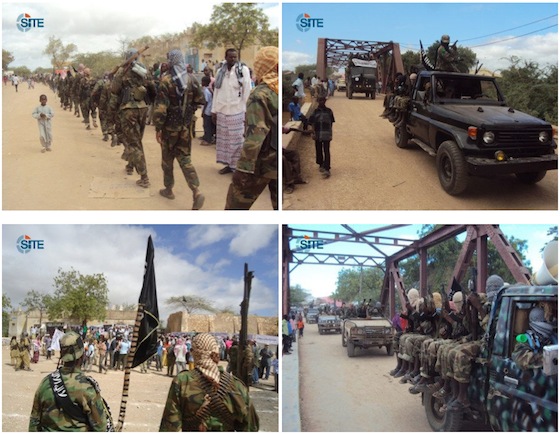
Yesterday, a Shabaab suicide bomber killed 16 people, including soldiers, in an attack at a cafe in the town of Beledweyne in Somalia’s Hiran governorate. The town is close to the Ethiopian border, and Shabaab said it was targeting African Union forces based there. From the BBC:
Al-Shabab said its target was Ethiopian and Djiboutian soldiers in Beledweyne.
The bombing occurred at a tea shop popular with the troops in Beledweyne, 300km (185 miles) north of the capital, Mogadishu, close to the border with Ethiopia.
“Our main target was Ethiopian and Djibouti troops who invaded our country,” Sheikh Abdiasis Abu Musab, al-Shabab’s military operations spokesman, said.
But witnesses, including a Somali MP in Beledweyne, Dahir Amin Jessow, have told the BBC that most of those killed were civilians.
Yesterday’s suicide attack was preceded by a large Shabaab military rally in the town of Bulobarde, which is also in Hiran and is about 90 miles south of Beledweyne. Shabaab released 13 photographs of the rally, which was held on Oct. 16. The photographs were obtained by the SITE Intelligence Group; four of them are published above.
Shabaab remains active inside Somalia and beyond. In the past month, Shabaab has launched a suicide assault on the Westgate Mall in Kenya, and repelled a raid in Barawe by US Navy SEALs that was intended to capture a senior commander who was involved in the Westgate Mall attack in Kenya and is associated with top al Qaeda commanders.
Despite a military offensive led by the African Union and backed by the US that began in 2011, Shabaab still controls vast areas of southern and central Somalia. During the offensive, Shabaab was driven from major cities and towns such as Mogadishu, Kismayo, and Baidoa, but towns such as Bulobarde and Barawe remain under the terror group’s control. The group has weathered the Ethiopian invasion, which began in December 2006 and ousted its predecessor, the Islamic Courts Union. More than six years later, Shabaab remains a capable force in southern Somalia and an integral part of al Qaeda’s global network.
Are you a dedicated reader of FDD's Long War Journal? Has our research benefitted you or your team over the years? Support our independent reporting and analysis today by considering a one-time or monthly donation. Thanks for reading! You can make a tax-deductible donation here.







